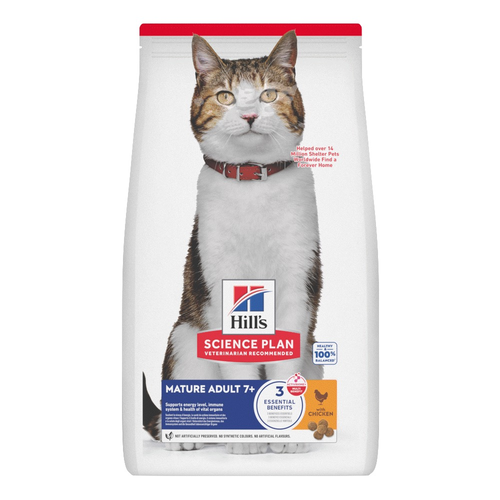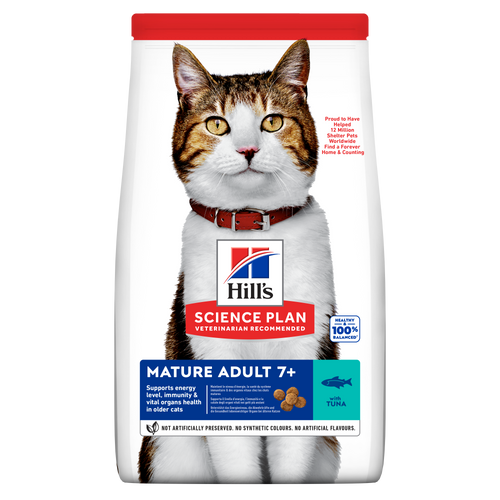
-
Featured products
 Small & Mini Mature Adult Dog Food
Small & Mini Mature Adult Dog FoodHill's Science Plan Small & Mini Breed Mature Adult Dog Food with Chicken is a complete pet food, specially formulated with ActivBiome+ Multi-Benefit Technology.
Tailored nutrition to support graceful ageing in small dogs. Specially made with a synergistic blend of nutrients for energy & vigor.Shop Now Small & Mini Puppy Food
Small & Mini Puppy FoodHill's Science Plan Puppy Small & Mini Breed Dog Food with Chicken is a complete pet food, specially formulated with ActivBiome+ Multi-Benefit Technology.
100% balanced nutrition to support optimal growth & the immune system.Shop Now Small & Mini Adult Dog Food
Small & Mini Adult Dog FoodHill's Science Plan Small & Mini Breed Adult Dog Food with Lamb & Rice is a complete pet food, specially formulated with ActivBiome+ Multi-Benefit Technology.
Tailored nutrition for the unique needs of small dogs during the prime of their life.Shop NowFeatured products Mature Adult Cat Food
Mature Adult Cat FoodHill's Science Plan Mature Adult Cat Food with Chicken is a complete pet food, specially formulated with ActivBiome+ Multi-Benefit Technology.
This food supports graceful aging in cats, providing a synergistic ingredient blend to help support energy & activity levels.Shop Now Oral Care Adult Cat Food
Oral Care Adult Cat FoodHill's Science Plan Oral Care Adult Cat Food with Chicken contains clinically proven kibble technology to reduce plaque & tartar build up.
Shop Now Mature Adult 7+ Cat Food
Mature Adult 7+ Cat FoodHill's Science Plan Mature Adult Cat Food with Salmon is a complete pet food, specially formulated with ActivBiome+ Multi-Benefit Technology.
This food supports graceful aging in cats, providing a synergistic ingredient blend to help support energy & activity levels.Shop Now -
Dog
- Dog Tips & Articles
-
Health Category
- Weight
- Food & Environmental Sensitivities
- Urinary
- Digestive
- Joint
- Kidney
Featured articles The Right Diet For Your Pet
The Right Diet For Your PetIn people, the right diet is very important. If you are eating the wrong way for your metabolism, activity level, age and lifestyle you could end up with health issues.
Read More The Incredible Science Behind Your Pet's Microbiome
The Incredible Science Behind Your Pet's MicrobiomeLearn what your pet's microbiome is, how it contributes to your pet's gut and overall health, and why nutrition is important in maintaining healthy microbiomes.
Read More Proteins
ProteinsTo make a protein, amino acids are linked together in a long chain. The chain is then bundled into to a three-dimensional structure, like a tangled ball of yarn.
Read More -


Fostering a puppy can be one of the most rewarding experiences for any dog lover. Barbara Shannon, a seasoned foster parent from Erie, PA, has cared for numerous rescue dogs over the years, and her favorites are the playful, energetic puppies.
“They can be a lot of work, but it's so enjoyable to watch them grow and develop their personalities," says Shannon. "It takes a lot of love and time, but it's the best experience."
If you’re considering fostering a puppy for the first time, knowing what to expect can help ensure both you and your furry guest have a positive experience.

Why Animal Shelters Need Puppy Fosters
Many animal shelters and rescue organizations rely on volunteers to foster puppies until they find their forever homes. This system helps shelters manage space constraints and gives puppies a chance to adjust to life in a loving family environment.
Nicole Bawol, Shelter Director of The Humane Society of Northwest Pennsylvania, emphasizes the importance of fostering pregnant dogs and young puppies.
“The shelter can be a loud and stressful environment," Bawol says. "Since puppies are more vulnerable to illnesses, fostering them in a home is ideal for their health and socialization."
She recalls a recent case where puppies rescued from a cruelty investigation transformed from anxious and aggressive to playful and confident after just a few weeks in a foster home.
“That’s the power of fostering — you give them a safe space, and they thrive,” she adds.


Tasty Tips
What to Expect When Fostering a Puppy
Before fostering a puppy, it’s helpful to be familiar with basic dog care and prepared for some messes. Here’s what you need to know:
Daily care: Expect to make time for feeding, walking, playtime, and socialization. Puppies often require more attention than adult dogs, especially if they have behavioral or medical needs.
Puppy-proofing: Puppies are naturally curious and love to chew, so creating a safe, enclosed space with a baby gate or playpen is essential.
Temporary care: After a few weeks in a foster home, most puppies are adopted quickly. Shannon notes that with the help of social media, many shelters can find homes for puppies within hours.
The Cost of Fostering a Puppy
The good news? Most shelters provide support for their foster families. Many cover veterinary expenses and offer supplies like food, leashes, toys, and bedding.
As a foster parent, you should expect:
Laundry duties: Be ready to wash bedding daily, especially with a litter of puppies.
Time commitment: Puppies need constant care and attention, especially if they require bottle feeding or other special care.
Safe spaces: As puppies grow, they become more adventurous, so creating a secure environment is crucial for their safety.
Requirements for Fostering Puppies
Each rescue organization has its own approval process for foster families. Typically, this includes an application, a background check, and sometimes a home visit.
“Some people think we’re overly strict since this is a volunteer job, but we’re responsible for the well-being of these pets and we take that seriously,” says Bawol.
The Reward of Puppy Fostering
Shannon admits that saying goodbye to foster puppies is never easy, but the joy of knowing they’re going to loving forever homes makes it worthwhile.
“Of course it's hard to say goodbye, but I remind myself that I’m just a step on their journey,” she says.
If you’re interested in fostering a puppy, contact your local animal shelter to learn more about their programs. Fostering timelines vary, and sometimes it may be weeks or months before a puppy needs your care, so staying prepared is key.
The joy of fostering puppies is indescribable — watching them grow, play, and learn will warm your heart and change their lives forever.


Kara Murphy is a freelance writer and pet parent who lives in Erie, Pa. She has a goldendoodle named Maddie.
Related products

Hill's Science Plan Small & Mini Breed Adult Dog Food with Lamb & Rice is a complete pet food, specially formulated with ActivBiome+ Multi-Benefit Technology.
Tailored nutrition for the unique needs of small dogs during the prime of their life.

Hill's Science Plan Puppy Small & Mini Breed Dog Food with Chicken is a complete pet food, specially formulated with ActivBiome+ Multi-Benefit Technology.
100% balanced nutrition to support optimal growth & the immune system.

Hill's Science Plan Small & Mini Breed Mature Adult Dog Food with Chicken is a complete pet food, specially formulated with ActivBiome+ Multi-Benefit Technology.
Tailored nutrition to support graceful ageing in small dogs. Specially made with a synergistic blend of nutrients for energy & vigor.

Hill's Science Plan Light Adult Small & Mini Breed Dog Food with Chicken is a complete pet food, specially formulated with ActivBiome+ Multi-Benefit Technology.
Helps keep your dog fit and active with our low calorie, great-tasting food.
Precise nutrition for less active adult small dogs that require a low calorie food to help maintain a healthy weight & lifestyle.
Related articles

Learn the the dangers of feeding your dog chocolate, which types are most dangerous, and what to do if you discover that they have consumed chocolate.

Learn what you can feed your pregnant or nursing dog to keep her and her new pups healthy.

Learn about the symptoms, causes and treatments of dry puppy skin and how to provide relief for your dog. For expert skin care advice, visit Hill's Pet MT.

Learn more about the problem of dog obesity and more importantly, what you can do to help your dog avoid becoming overweight.

Put your dog on a diet without them knowing
Our low calorie formula helps you control your dog's weight. It's packed with high-quality protein for building lean muscles, and made with purposeful ingredients for a flavorful, nutritious meal. Clinically proven antioxidants, Vitamin C+E, help promote a healthy immune system.
Put your dog on a diet without them knowing
Our low calorie formula helps you control your dog's weight. It's packed with high-quality protein for building lean muscles, and made with purposeful ingredients for a flavorful, nutritious meal. Clinically proven antioxidants, Vitamin C+E, help promote a healthy immune system.

